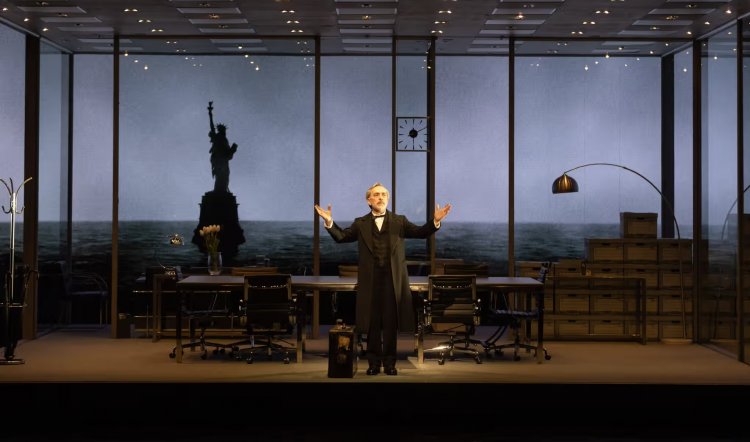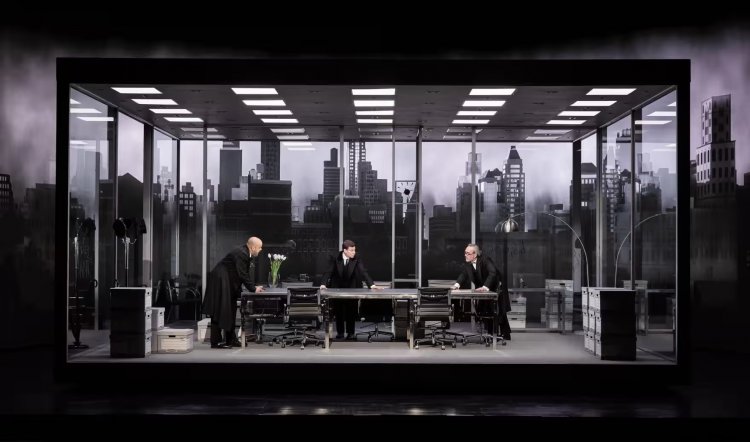
THE LEHMAN TRILOGY
THE LEHMAN TRILOGY, National Theatre and Neal Street Productions at the Theatre Royal, Sydney to 24 March 2024. Photography: Daniel Boud
Timing is everything. When eminent Italian playwright/author Stefano Massini’s radio play-poem Qualcosa Sui Lehman (Something About Lehman) was first published as a (massive) novel in 2016, it was just eight years after its final scene: the Global Financial Crisis. However, the GFC is now a generation in the past, already reduced to Economics 101 footnotes and ill-understood or misremembered by everyone else.
Timing is everything. This three-hour-plus stage play, adapted by Ben Powers and directed by Sam Mendes for the National Theatre in 2018 had one golden year. In it, the production achieved cartloads of plaudits, awards, and nominations at the National Theatre, the West End, and New York and Broadway before another cataclysmic event – the Covid-19 Pandemic of 2019-onwards – spoilt its party.
Timing is everything. A handsome production arrives in Sydney in 2024, seven years on from that initial success, and into a different world. Ukraine, Gaza, $80 million for a waterfront mansion, Alexei Navalny, AI. And it seems The Lehman Trilogy is now a curiosity with a superb cast of three – Howard W Overshown, Aaron Krohn, and Adrian Schiller – rather than anything more relevant or urgent.
Unlike other now-mythic catastrophes – the world wars, the 1929 Depression – the GFC as yet lacks an All Quiet On The Western Front or Grapes of Wrath to make it popularly memorable. And The Lehman Trilogy is not it. Although the third act of its wordy denouement covers the event, it’s too weighed down by finance jargon and abstracts to deliver either drama or clarity.

Timing is everything. The Lehmans sailed to America from Bavaria in 1844, in pursuit of the dream of a better life. The play opens on the first arrival: best shoes on for Hayum “Henry” Lehman (Schiller) as he takes his first steps ashore in the New World, to his future. It’s a simple and moving moment of humanity in a script that mainly fails to deliver that warmth.
That’s the problem with a saga about three brothers whose passion in life was making money, and making that money make more money. The wives and children are reduced to ciphers and the humour derived from them is as caricatures depicted by one or other of the actors. However, there is one memorably fanciful scene in which a Lehman apparently invented consumerism.
Timing is everything. Although the saga of the brothers and the play begins in 1844, their bank’s collapse occurs 39 years after the last Lehman to front it is dead. The men who come after are neither Lehmans nor interesting and the action is reduced to theatre’s chief no-no: telling rather than showing. If economics and banking were not already as tedious as toothache, the unabashed resort to an increasingly urgent recitation of events makes it even more obvious.
Timing is everything. The fabled Es Devlin, designer of boxes within boxes, delivers much of the excitement generated by The Lehman Trilogy as the actors and the revolving glass office box constantly interact. As it turns so does time: from their Alabama shopfront to cotton fields and the Civil War (curiously, both minus slavery). From commodities to intangibles and the making of money for money’s sake.

Timing is everything. The panorama behind the glass box also turns: from ocean to rows of cotton, to the low-rise of early New York, then up and up to its more recognisable skyline. And all while the actors move from event to event, room to room, as dozens of archive boxes are placed and re-placed, stacked and re-stacked to represent every aspect of Lehman life. It’s mesmerising and highly effective, complemented by superb lighting and video design (Luke Halls and Jon Clark). The mechanics of performance are rarely so well demonstrated.
Ultimately The Lehman Trilogy is a family saga, an American history, and a summer course in modern economics that’s at once too much and not enough. It’s fascinating and frustrating yet the performances of Howard W Overshown, Aaron Krohn, and Adrian Schiller are breathtaking. A (glass) cabinet of curiosities whose day has come and gone. Timing is everything



-c444x300.jpeg)